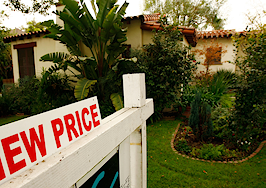In these times, double down — on your skills, on your knowledge, on you. Join us Aug. 8-10 at Inman Connect Las Vegas to lean into the shift and learn from the best. Get your ticket now for the best price.
The U.S. housing market’s total value dropped from $47.7 trillion in June 2022 to $45.3 trillion in December — the sharpest six-month drop in home values since the Great Recession. (Redfin said it used rounded numbers for its report but unrounded numbers when calculating data, giving a slight discrepancy.)
“The housing market has been shedding value because homebuyer demand has waned, which has also caused home prices to fall from their peak,” Redfin’s latest market report released on Wednesday reads. “Homebuyer demand slowed in large part because rising mortgage rates — a consequence of the Federal Reserve’s effort to curb inflation — made purchasing a home more expensive.”
The decline in home values is concentrated in urban markets along the coasts with the Bay Area bearing the brunt of a shifting real estate market, according to the report.
The total value of San Francisco homes fell 6.7 percent from $555 billion in December 2021 to $517.5 billion in December 2022 — higher than any other market in the U.S.
Oakland (-4.5 percent) and San Jose (-3.2) followed close behind, with New York (-1 percent), Seattle (-0.4 percent) and Boise, Idaho (-0.3 percent), rounding out the list of markets with diminishing home values.

Ali Mafi | Redfin
Although the total value of homes in these markets fell from 2021 to 2022, Redfin notes median home sale prices are still robust enough to keep sellers in the market.
San Francisco’s median home sale price declined 9.4 percent annually to $1.3 million in January 2023, which still enables sellers to make a solid profit while luring more homebuyers back onto the scene.
“Three of my listings recently went under contract after sitting on the market for more than a month,” San Francisco-based Redfin agent Ali Mafi said. “They all had a few showings here and there in the fall, but no buyer wanted to pull the trigger. And then suddenly in the new year, we had 10 or 15 people touring each property.”
While the market shift has stifled the total annual home value growth in urban markets (+2.5 percent), the total home value growth in suburban markets is still benefitting from the early-pandemic population shuffle, with values rising 6.4 percent annually to $25.4 trillion in December.
Redfin singled out Florida as a prime beneficiary of 2020 and 2021’s great reshuffling, with homebuyers from the Northeast and West Coasts flocking to the Sunshine State in search of more space and greater affordability.

Elena Fleck
The total value of homes in Miami rose 19.7 percent year-over-year to $468.5 billion in December, keeping Miami near its July peak of $472 billion.
North Port-Sarasota, Florida (+17.8 percent), Knoxville, Tennessee (+17.7 percent), Charleston, South Carolina (+17.4 percent) and Lakeland, Florida (+16.9 percent), also experienced double-digit bumps in total home values.
“Florida’s housing market is being sustained by folks moving in from the North and as of recently, the West Coast,” said Elena Fleck, a Redfin agent in Palm Beach. “People are pouring in from New Jersey and New York, in large part because Florida has relatively affordable homes and no income tax.”
“They can get a lot more bang for their buck here,” she added.
Redfin Economics Research Lead Chen Zhao said the current housing market is a mixed bag with demographic divides guiding homebuyers’ ability to successfully enter and benefit from the housing market.
When factoring in age, millennials came out on the winning side in 2022 with the total value of U.S. homes owned by this generation rising 26.7 percent year over year to $5.6 trillion.

Chen Zhao | LinkedIn
Gen-Xers saw the second largest increase (+18.4 percent to $13.9 trillion) followed by baby boomers (+12.9 percent to $18.1 trillion) while the silent generation experienced a decrease of 6.7 percent to $4.4 trillion) — reflecting this generation’s move to retirement homes.
When factoring in race, Asian neighborhoods experienced the largest decline in total home value (-0.7 percent to $1.2 trillion) due to the fact that the majority of predominately-Asian neighborhoods are located along the coasts.
Meanwhile, majority Black neighborhoods saw a 5.8 percent gain to $1.2 trillion, majority white neighborhoods saw a 6.9 percent gain to $37.4 trillion and majority Hispanic/Latino neighborhoods saw a 7.9 percent gain to $1.9 trillion).
“The housing market has shed some of its value, but most homeowners will still reap big rewards from the pandemic housing boom,” Zhao said. “The total value of U.S. homes remains roughly $13 trillion higher than it was in February 2020, the month before the coronavirus was declared a pandemic.”
“Unfortunately, a lot of people were left behind,” she added. “Many Americans couldn’t afford to buy homes even when mortgage rates hit rock bottom in 2021, which means they missed out on a significant wealth-building opportunity.”













